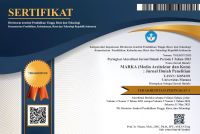Evaluasi Layanan Jalur Sepeda pada Rute Jalan Ryacudu Kota Bandarlampung
Abstract
The City Government of Bandar Lampung has made several routes for bicycle lanes including the Jalan Ryacudu Route. This path is quite busy used by cyclists for their various purposes. This study aims to determine the dominant factor in the level of satisfaction with bicycle lane services and to determine differences in levels of community satisfaction regarding bicycle lane services on the Ryacudu Road route. The method used in this research is descriptive quantitative method. Data collection was carried out through a closed questionnaire on 441 respondents. The data were analyzed using distribution analysis, analysis and analysis of variance (ANOVA). The results showed that 1) the dominant variables that influence the evaluation of bicycle lane services include: lane arrangement (3.95), convenience from traffic (3.91), and comfort in bicycle lane conditions (3.87). 2) The difference in the level of significant satisfaction occurs in the mileage variable. Medium mileage (5-10 and 11-15) tends to have a high level of satisfaction.
Downloads
References
Boettge, B., Hall, D. M., & Crawford, T. (2017). Assessing the bicycle network in St. Louis: A place-based user-centered approach. Sustainability (Switzerland), 9(2), 1–18. https://doi.org/10.3390/su9020241
Enrico, K., Riani, D., & Silitonga, S. P. (2021). Evaluasi Implementasi Jalur Sepeda Di Lingkungan Universitas Palangka Raya. Narotama Jurnal Teknik Sipil, 5(2), 45–53. https://doi.org/10.31090/njts.v5i2.1564
Janarko, D. D. (2014). Kajian Prasarana Transportasi Internal Jalur Barat Universitas Negeri Semarang (Kopma–Pkmu) Ditinjau Dari Persepsi dan Observasi. Universitas Negeri Semarang.
Manum, B., & Nordstrom, T. (2013). Integrating bicycle network analysis in urban design: Improving bikeability in Trondheim by combining space syntax and GIS-methods using the place syntax tool. 2013 International Space Syntax Symposium.
Masturi, H., Hasanawi, A., & Hasanawi, A. (2021). Jurnal Inovasi Penelitian. Jurnal Inovasi Penelitian, 1(10), 1–208.
Pan, X., Zhao, L., Luo, J., Li, Y., Zhang, L., Wu, T., Smith, M., Dai, S., & Jia, P. (2021). Access to bike lanes and childhood obesity: A systematic review and meta-analysis. Obesity Reviews, 22(S1), 1–11. https://doi.org/10.1111/obr.13042
Pesshana, G., Romanel, C., & Novo, J. (2020). An Index for Evaluation for Urban Bicycle Lanes. IOP Conference Series: Earth and Environmental Science, 503(1). https://doi.org/10.1088/1755-1315/503/1/012001
Prasetyo, A., Nugroho, M. W., Amudi, A., & Yulianto, T. (2020). Kajian Awal Perencanaan Lajur Khusus Sepeda Dengan Menggunakan Metode IPA (Importance Performance Analysis) dan SWOT. Publikasi Riset Orientasi Teknik Sipil (Proteksi), 2(2), 41. https://doi.org/10.26740/proteksi.v2n2.p41-47
Ratnaningsih, D. (2017). Evaluasi Jalur Sepeda Di Jalan Arief Rahman Hakim Kota Malang. Prosiding Simposium Forum Studi Transportasi Antar Perguruan Tinggi Ke-20, November, 4–5.
Rohmadiani, L. D., & Iskandar, S. A. (2020). Analisis Efektifitas Jalur Sepeda Berdasarkan Metode Bicycle Level of Service (BLOS). Ge-STRAM: Jurnal Perencanaan Dan Rekayasa Sipil, 3(2), 64–69. https://doi.org/10.25139/jprs.v3i2.2754
Rusmandani, P., Arifin, M. Z., & Wicaksono, A. (2015). Perencanaan Implementasi Lajur Sepeda Di Kota Tegal. Rekayasa Sipil, 9(1), 64–73. https://rekayasasipil.ub.ac.id
Sales, M., Tobias, G., & Costa, J. M. (2021). Open Access Cyclist ´ S Perception of Service Quality As a Tool for Bike Path Projects Evaluation. 11(1985), 49953–49957.
Sulistyo, D., Triana, B., & Winarsih, N. (2011). Upaya Penggunaan Sepeda Sebagai Moda Transportasi di Kota Surabaya. Proceeding PESAT (Psikologi, Ekonomi, Sastra, Arsitektur &Sipil), 4, 46–50.
Werner, C., Resch, B., & Loidl, M. (2019). Evaluating urban bicycle infrastructures through intersubjectivity of stress sensations derived from physiological measurements. ISPRS International Journal of Geo-Information, 8(6). https://doi.org/10.3390/ijgi8060265
- Abstract 157
- PDF (BAHASA INDONESIA) 144
Copyright (c) 2023 Rio Abdullah Romadhon, Haris Murwadi

This work is licensed under a Creative Commons Attribution-ShareAlike 4.0 International License.







